As we mark the first anniversary of last year’s devastating Lahaina fire, this immense tragedy also continues to be a catalyst for redefining the future of Hawaii tourism. The fires have been a catalyst for an overdue, comprehensive reevaluation of tourism’s vital role in the Hawaiian Islands.
The fires of 2023 placed Hawaii’s tourism practices under a global spotlight. As the world watched, there began a collective reevaluation of how tourism intersects with local communities and environmental sustainability. This is receiving more global attention this week courtesy of, among other things, this ABC special, which delves into the challenges and opportunities that have emerged from this crisis. It comes as we explore whether Hawaii can lead the way in future tourism practices that simultaneously prioritize cultural preservation and environmental stewardship with iconic travel. Or not.
Maui became a major catalyst for Hawaii tourism change.
The Maui fires continue to serve as a catalyst for reevaluating tourism in Hawaii entirely, highlighting the need for a more sustainable and community-focused approach than was ever envisioned.
We continue to reflect on the government’s horrific response in all ways. Gov. Green, who has remained controversial, said:
“My strategy all along from the beginning before the fire was to get some impact fee from travelers to pay for disasters.”
Maui at a crossroads one year after devastating Lahaina fire.
The island continues to recover, albeit slowly, with the focus on rebuilding from the fire while revitalizing its tourism sector. Lahaina shows visible signs of recovery, with ongoing construction and efforts to restore normalcy. However, tourism remains down, with visitors including BOH editors noticing a changed atmosphere and increased sensitivity in the disaster’s aftermath. In contrast, South Maui, largely unaffected by the fires, continues to offer its signature luxury and leisure experiences. The ongoing challenge is finding balance between tourism recovery, community resilience and sustainable development.
Hawaii’s tourism transformation remains in process.
The fires have accelerated a perceptible and significant shift in how Hawaii as a state perceives and manages tourism. Tourism remains the only driving force in Hawaii’s economy, and the entire world is watching how the industry adapts to new challenges. This includes implementing sustainable practices, promoting lesser-known destinations, and engaging tourists in more meaningful cultural exchanges.
Where do visitors stand in the transition?
Visitors remain challenged by still rising travel costs and a growing feeling that the islands now cater primarily to the wealthy. Numerous articles on Beat of Hawaii have highlight concerns about the affordability of visiting Hawaii, with many potential travelers feeling priced out by expensive accommodations, dining, and activities. This shift in perception poses a challenge to Hawaii’s tourism industry, which had long-relied on middle income visitors, and must still find ways to balance offering high-cost experiences with maintaining accessibility for a broader range of visitors. As Hawaii redefines its tourism model, addressing these perceptions will be crucial if it wishes to attract a diverse array of visitors that helps ensure long-term sustainability.
Public sentiment on Hawaii tourism and recovery swings widely.
The conversation around Hawaii’s tourism recovery is as diverse as the islands themselves. Here’s a look at some of the public sentiment that emerged in your comments:
Robert T started, “The Government of Hawaii fails to prevent 102 deaths in the Lahaina fire and the Gov thinks an impact fee on tourists can pay for disasters? “Justice for the victims is not only monetary; those who failed to protect the citizens need to be held accountable.”
David says, “Our economy is way too dependent on tourism. We must start looking into other job sectors.”
Ron F. writes, “The disaster is being politicized, but no one is tackling real issues like affordable housing.”
Robert S. comments, “Tourism brings stability. Taxes from it should be used to build affordable housing.”
Brian points out, “It’s not just external factors; it’s systemic corruption and inefficiency in the government.”
David insists, “Politicians need to focus on job creation beyond tourism.”
Eva B. appreciates, “Oprah and Dwayne Johnson’s contributions have positively impacted our community.”
Mike J. suggests, “Tourism is crucial, but it must align with local needs and sustainability.”
Susan L. shares, “Affordable housing has been a longstanding problem, not just because of tourism.”
Jessica T. argues, “This is a chance to rethink and reshape our economy for future generations.”
Tom W. advises, “Community involvement in decisions will lead to better outcomes.”
The future of Hawaii tourism.
The aftermath of the Maui fires has presented an unexpected and, in many ways, unwanted opportunity for Hawaii to redefine its tourism strategy within a new global context. As the islands continue to navigate this still transformative period, there is a pressing need to explore innovative approaches that balance economic growth via tourism with community well-being.
What do you think are the best steps forward? We invite you to share your thoughts on how Hawaii can thrive in this evolving landscape and ensure a sustainable future for residents and visitors.
On this first-year anniversary, our thoughts are with the people of Maui, those who lost their lives, were injured, lost their homes, and continue to suffer from this tragedy.
Get Breaking Hawaii Travel News
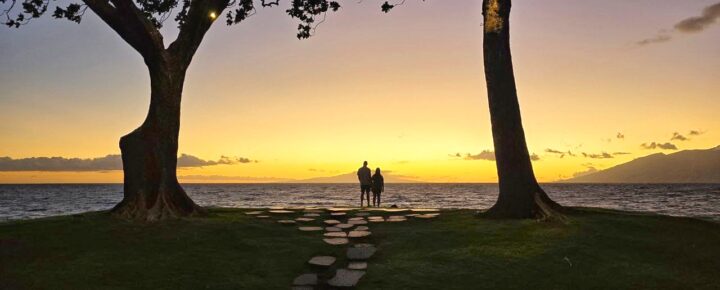
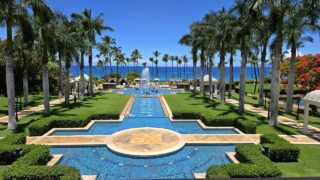
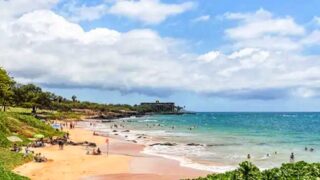

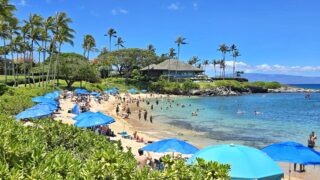
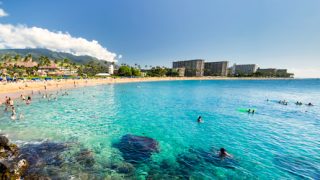
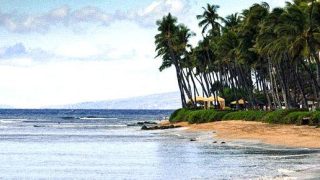
It’s complicated, our property is a leasehold property, the family who owns the property and lives down the street, sold the developer a 99 year lease to be used to build a vacation rental resort complete with a vacation rental office. To my knowledge no one has ever rented out their unit to a long term tenant except for fire victims. The value of our leasehold would go way down if we are unable to use the property for its intended use as a vacation rental. We or whoever buys our units will need to renegotiate the lease with the land owners based on it’d value as a long term rental. The residual value of the land would greatly reduced to reflect the change in status of the property.
Str’s – It’s complicated, me a haole from San Jose but married into a family where the parents and grandparents born and raised on Oahu, worked the cane fields as indentured services. My first trip, 1974, I fell in love with Hawaii and not to long after bought a time share on Maui. Mid-eighty’s bought the place have now and we love it. Last year my niece got married on the lawn in front my place, she married a school teacher from California but his father was born and raised on Oahu and many of his family members from Oahu and the Big Island attended wedding, it’s complicated.
The rebuilding of lahaina needs to be focused on what the residential needs are. Not on what the wealthy want catered to them. There first should be made an affordable, truly affordable option for the folks that lost their home. And then nobody can buy property there with the intent of building a “luxury” home unless they have been a full time resident of the island for a minimum of 10 years. Lastly. Transparency, open meetings and forums to include the residential and public voice before the vote. And I mean it. Before the vote. Abolish closed door meetings of any council. That’s my two cents. Thank you.
You did not approve my first comment, so I will try again. The article is written in a way that signals approval of the governor’s preference for tourism: wealthy tourists or tourists who have their lodging paid for by corporations who stay in resort hotels. The article favors Increased occupancy for hotels (who take their profits off island) and decreased occupancy for STR’s, that are owned by individuals, and their proceeds stays on island, even if they do not live here full time That is because they employ all local people, and don’t have much, if any, profit to “extract,” as Lahaina Strong is fond of saying. I also notice that whenever you travel, you stay in hotels. So it seems to me, Beat of Hawaii profits from the hotel lobby and actually think the mayor’s bill, which is decimating the economy before it even passes, is a good idea. Perhaps in your travels, you could begin staying in STR’s to demonstrate a more balanced view of Hawaii lodging choices.
Excuse me, are we the Aloha state or the Alone-ha state? It saddens me to know that some of you think that South Maui has been unaffect from the fires? We only had 1 shift a week to survive on until Feb 2024! We were not able to get any assistance but fortunately had savings, hoping tourism would come back helping all of us out! Kaanapali to Kapalua still provides luxurious hotels to use as well. It was the messaging from our leaders not to come here! Message has been well received. We have friends leaving everyday. Now, FEMA has created a worst nightmare for renters here by paying absurd rates. NOW, it has increased everybody else who rents! Unaffordable for all of us!!!! HECO electricity is the highest in the nation! Why are they INCREASING their rates? Who is going to pay the bills while everyone goes thur training in a different degree or vocation? Bring back your Aloha spirit and starts with our message of welcoming everyone back to our beautiful islands!
Affordable housing starts with the subdivision of property. The County owns property around the island, why have they not already started the process of subdivision. If they’re waiting for a private developers to spend millions to process a subdivision only to be turned down after 3 or 4 years, that not going to happen, you can’t trust Maui County government. So it up to the Mayor and the planning commission to process these affordable housing projects, private developer won’t touch it especially now with the negative sentiment. It’s the counties job to make this happen.
J. If it quacks like a duck …. Maui residents have been polled and, as I understand it, do not agree that the STRs should be shut down. They fully understand the impact. I also believe the planning board is stalled after the last terrible hearing on the law the Maui council wrote. So if the law gets passed, it’s likely the mayor and council will be voted out of office. To your point, a PPP could easily be negotiated and adequate affordable housing could be provided if the ducks that are in charge were replaced or convinced their pro-big hotel position is not going to work. We were just there and the ads being run now on tv & radio against the new law are very compelling and are doing their job. Keep beating the drum.
Do you ever wonder why Governor Green, Mayor Bissen and Hawaii Tourism Authority President Daniel Nahoopii are pushing so hard to close down STR’s on Maui and promote tourist to stay in Hotels. Nahoopii was and maybe still is a lobbyist for the hotel industry. You notice the sign along the bypass promoting hotel activities, you wonder what is up?
This move will reduce the counties income by over a billion dollars in tax revenue, provide housing maybe for 500 locals if they want to pay the outrageous AOAO fees these condo’s come with. If the county directed those taxes just toward building homes on the hillside at cost of 300k each it could provide 3-5 thousand new affordable homes for locals for free, just do the math and wonder why these guys are tanking the vacation industry on Maui. So are they all in the pockets of the big Hotels?
J – Mufi Hanneman is the new President of HTA. He is a wise servant leader. I believe the first item on the agenda is to lower the # of visitors; the best legal tool is to reduce accommodation inventory. TVRs are the low-hanging fruit. To lessen the economic impact, those TVRs owned by residents might be exempt. It seems that a restructuring of the visitor industry is taking place. A goal should be to maximize retention of tourist spending. Hotels employ many, market the sector with huge budgets, cause less friction with residents than a neighborhood TVR, and extreme nightly room rates correlate to large TAT – the problem profits exit – a solution could be for resident-owned management companies to operate these Hotel properties. I recommend reading “Kelley’s of the Outrigger” to understand better. Looking back on history often holds answers to present problems.
Like the balance required for forward motion on a bike, Maui must find its balance to progress. Balance between: “Going back to the Land” vs. “Going back to business as usual”. The beauty is one doesn’t negate the other. “Going back to the land” provides little to no pollution, sustainability at the core and it is a simple harmonious life. On Maui, we should be growing our own Food at the very least. “Going back to business as usual” is tourism. The most lucrative economic gift for any place. The key is management. It is an export business, where people inject money made from another economy into this one. No manufacturing, no waste, no pollution (other than the traveling to get here). The export product for Hawaii is the experience of this place, people and the Aloha Spirit. Respecting other’s grieving process – each has their own pace. All power underground, the cost today will save future lives and money and lastly let Lahaina rebuild Lahaina.
Antoinette, you’re on the right track and communicate it so well. What’s needed now are leaders that can lead without putting their personnel $ benefit first. Underground power is difficult on a volcano but well maintained above ground lines are ok. That’s not what we have today.
From what I hear Muffy is in it for Muffy. Lowering the TVR supply only raises prices for the big hotels. The voters will decide this and many current officials will be sacked. They will be replaced by people that will focus on bringing new industries to HI and building affordable housing instead of lining their pockets.
Antoinette – such a well-thought comment and a tangible set of recommendations. I sincerely hope this train of thought can rise to the surface and cause some practical conversations about how to achieve that balance. Thank you for putting it so clearly.
Another point: the editors ask, “where do visitors stand” … and the answer is clearly “fodder for the government and hotel industry.” Josh wants to charge a fee to monetize visitors. Hotels want to charge higher rates. No one seems to be focused on making it more interesting / valuable / rewarding for visitors to come to Hawaii. The only interests that seem to matter are the profits of hotels and the government drones they have purchased.
Everyone says “there must be a focus on jobs beyond tourism.” Which is a nice sentiment … but completely hollow until someone suggests something – anything – that could actually replace tourism as the economic driver. What do you suggest? Technology … outsourced services … research … ocean-based fuel sources? Don’t just say there must be something else … be specific. Because otherwise you’re just distracting from an actual solution.
Since tourism is such a problem, let’s “own the problem.” Let the Lahaina and her residents own the accommodations and provide short-term rentals instead of exploiting our people and our lands to enrich private equity firms and real estate investment trusts. Let the people of Lahaina tell our story.
“The fires have been a catalyst for an overdue, comprehensive reevaluation of tourism’s vital role in the Hawaiian Islands.”
This thesis highlights precisely what is wrong with Hawaii. “Tourism” didn’t cause the Lahaina fire, nor did “tourists” make the fire a cataclysmic event. Gross government incompetence is responsible for the property destruction and loss of life.
Accordingly, the Lahaina fire should have been a “catalyst” for a total “reevalulation” of Hawaii state government. And a “reevaluation” of the incompetence of elected Hawaii officials and of Hawaii government employees.
There are many, many articles detailing total, complete failure of Hawaii government’s response, including the former heads of Maui’s Emergency Management Agency, the Hawaii Department of Land and Natural Resources, and many others. Start with Hawaii ignoring reports in 2010, and again in 2020, specifically warning about the potential for a devastating Lahaina fire.
We are currently in Maui as I write this. We were in Kapalua when the fires happened last year – in Lahaina the night before the fire began. While there in 2023, we realized the risk of fire was evident all around (I have a risk management background). That said, the threat of fire is still very real here (i.e., endless fields of dry invasive grasses, shoddy electrical poles amongst other poor infrastructure). Government has done little if any to mitigate the risk. All that is needed is the set of circumstances like in 2023 to have an out of control fire. The failures of the Hawaiian government continue, whether it is poor land management, decades of ignoring housing issues (& STR bans are not the answer) and sending mixed messages to tourists. Sad to say, not much more will change by the 2nd anniversary. Prayers continue for Maui.
Unintended consequence – When all these condominiums are no longer STR’s we will be laying off all employees, maids, room checkers office staff, maintenance staff, window washers, the hula dancers, yuke player and maybe leave 1 employee on site. If it is not run as a resort we won’t need them.
We had one full time employee during the Covid shut down this will be the same except we won’t be hiring them back. During Covid , most of the employees relocated to California and Nevada and never came back. It’s already happening now not because of the STR’s but because there is no affordable housing, something you can rent for 2-3K a month on West Maui, these is plenty of land but the politicians are too busy flying to Japan on boondoggle at our expense, wake up.
We are longtime timeshare owners on Maui. It was a tragic situation when Covid hit, and another tragic situation with the fires a year ago. Our hearts broke for the people of Maui. We donated to the food bank a few times during the past year (like we do at home) and went back in February because it’s our favorite place. We were treated kindly and felt welcome. We are headed back next week for our makeup trip that was cancelled last year due to the fires. Now, we are not wealthy visitors but we just want to hang out on the beach, do a sunset sail, go to some local restaurants like Mala Tavern and Star Noodle and get a beer at Maui Brewing. Is that being ‘mindful’? I hope we are still welcome. Our son and his family just got back from a trip to Maui and had a lot of fun. My brother and his family are on Oahu right now and just hanging out at the beach. We just want to go on vacation and de stress. I don’t want any angst about vacation.
The Mayor’s STR ban is a destabilization of the real estate market for all Maui properties. We have already seen an owner sell a unit for less than half of the last sale of a like kind unit, still sold for a little over a million and the AOAO fees are over $7,000. A month, so not affordable and wasn’t resold to a local. The other owner’s are filing appeals to the current real estate tax valuations based on the sale.
I’m sure the banks in Hawaii are thinking how many of the unit owner will walk away from their under water condo’s. We will see some owners buy lower priced units with possibly better locations, close escrow and let the other condo be foreclosed on by the banks.
After this is all over and if the mayor is successful in banning str’s the property taxes for the str properties will go way down, 10% of what there are now and county will loose all those millions of tax dollars and they will need to replace the income and your taxes are going up.
This is Maui’s chance to build a beautiful new Lahaina! If they prefer it could be built with a charming old fashioned facade.
Each island has similar but different needs. For Maui, needs to fix its electrical power and water infrastructure problems and find ways to attract other industries. PPP (Public Private Partnerships) is a proven model that should be implemented. Affordable housing and streamlining permitting and inspections need to be included. The quickest way Maui citizens can help is to elect public officials that are focused on these subjects instead of the same old tax and spend approach. That includes county officials as well as state legislators and the governor.
Repealing the hundred year old Jones Act would dramatically improve the cost of living and the cost of doing business in Hawaii. But this topic is like the thousand pound gorilla in the attic. Everybody knows its there, but nobody wants to talk about it!
I used to be a property owner in Maui. Mys sister still owns a place there. It was always my favorite go to, easy to get to, vacation place. No longer.
The toursim industry decided there was no limit to what they could charge, the goose would always lay golden eggs. Locals began to resent the tourists taking over the islands, Nice laid back attitudes began to evaporate.
Too many other places in the world to visit at less money and more love.
So the government and the locals want to dial back the dependence on tourism…what else you got? You need to go back to the turn of 1900’s and what have you got there? Plantations exploiting workers. It is a false narrative to think simplier times pre-tourism will sustain the population.
Hawaii created the tourism boom and now they regret it. Maybe there is an eco-tourism element that can be put forth but I doubt the islands will want to go back to poor workers and rich property owners
I can’t see anything getting better until your elected officials stand up and start accepting that ‘they’ are the major reason for the present problems. Another scapegoat idea,”tax the tourists even more to pay for disasters”, as if we aren’t already being taxed up the okole. How about the billions of dollars you receive each year from tourism be used for the purpose they were collected, instead of frivolous spending. How about building more affordable housing, getting rid of the thousands of cesspools that pollute your kai and aina, controlling some basic food costs so your people don’t have to work 2 and 3 jobs. I’ve always believed, no matter the government, it’s always easy to spend someone else’s money.
Before the Lahaina fires, tourism was already in crisis on Maui. Too many tourists literally loving Maui to death, all at the expense of the local population that continued to get priced out their homes.
I firmly believe the answer is moratorium on all new residential development aimed at visitors. No more condo complexes for the STR market, no more luxury homes for the obscenely wealthy. Build workforce housing and take care of all those displaced by the Lahaina fires. Then and only then, reassess.
I’m always amused when someone strongly puts forth an idea that has already been implemented. There is already a moratorium on STRs. No new ones can be built. No new ones can even be started, as there is a cap on all of the permits in all zones except Hotel. As far as no building for the wealthy…well…good luck with that.
And as far as “loving Maui to death”…don’t worry, it’s not happening anymore, and that expression is but a distant memory.
It used to be sugar and pineapple. Now it’s the military and tourism.
The biggest block to diversification is our local governments. They make it almost impossible to do anything. They appoint their political supporters and family to run the business of the islands. How did that work out for Lahaina? You got what you paid for.
People with good ideas that might diversify the economy soon find this out and go elsewhere. If you’re not in the club, you’re out.
Before the fires, there was obviously not enough affordable housing for the locals, as several families were all living under one roof. Now they are saying the Short term rentals are the problem. These rentals have brought and nourished their islands and gave job opportunities to the locals for decades. The government needs to take care of their locals, build more affordable housing. Bring back tourism so that they can afford living in their own homes. Without it, I feel, the island will be impoverished and people will have to leave. Other than tourism you have nothing else to sustain your island, no sugar cane fields, pineapples, etc. What will happen to the resorts, hotels, small businesses? If locals don’t have jobs, how are they to sustain the island. Less opportunities, no tourism, no jobs, supply business will fail…nothing good will come out of this. The trickle effect is real and we see it coming. The governor needs to take of your islands and your people, js.
54 years ago, living on Oahu, (now on Kauai), downtown Lahaina street skyline looked like a third world country with tangles of various utility wires over the streets. City officials ignored warnings from the fire chief & the building code enforcement. They were partner with their real estate developments for self-enrichment.
Families told me of relatives who advised of the danger were told, “If you don’t drop this issue, you will be looking for another job!” In other words, “Get out of the way of my money!”. It was a quiet little secret & several did not like was happening & were vocally quashed. Even the press was told to, “Drop the story”. Real estate people were threatening to pull their advertising from the newspaper. There is no “free press”. Several walked away because of the known risk & officials who did not want anything done. It continued for years.
Now that the body count is in, they have to start over. Hopefully with adherence to building & fire codes!
The fire was totally tragic. But, Hawaii was already out of control. From hotels to dining, everything is overpriced. It feels like only the wealthy can afford it now, which is disappointing for those like me who have loved and visited the islands for years.
Sadly it took the fires to be a catalyst for changes.
I’ve always tried to be a conscious Hawaii visitor, but this really drives home the importance of balanced tourism. It’s great to see these issues being brought to the forefront. Hopefully, it will encourage the industry and visitors in the right direction.
Glad to see this discussion happening. Hawaii’s unique culture and environment deserve thoughtful tourism management. Not sure if this can get anywhere, but hopeful.
My wife and I are visiting Riudoso, New Mexico and can really see a contrast between how they have delt with disaster compared to Maui. They had several Major forrest fires here that destroyed over 1400 structures, then major floods (caused by burn scars) that destroyed at least another 1400 structures. The only thing I found on their websites is notes apologizing for the mess, asking visitors to “be careful” and stating they were open for business. No one admonishing tourists to avoid the disaster areas. No one asking me to help clear debris. No one asking me to adopt American Indian religion and culture during my visit. Did we stay away from destruction and gawking at others misfortune? Of course. Might there be a few bad apples that go where they shouldn’t? I’m sure, but the locals here did not have a chip on their shoulders daring everyone to mis step. We have had a wonderful time here. We are sad for what has been lost, and we’re happy to inject some capital.
You said that one of the goals is to “promoting lesser-known destinations”? I hope they’re careful with that, because that’s how tourists have been getting into trouble. On Maui, locals have been becoming enraged when tourists go “off the beaten path” and attempt to visit areas that might be frequented by locals. They much prefer visitors remain sequestered in “designated resort areas”.
It would be nice if some of the super rich people that have invested (bought) Hawaii would help to jump start some new businesses. It’s hard start new enterprises, but these people know how to do it. There are opportunities in Healthcare, Education, Music and Performing Arts, Defense, Climate Research, Agriculture. But until these things get going you better keep your tourism model.
The governor and Mayor are being very effective at lowering the tourist numbers, our resort is like a ghost town with only a few units occupied. The association dues (7,100 a month) are still due and I just sent off the property taxes for 6 months over 11,000. We continue to lose employees to mainland jobs. Can it get any worse for the business owners and employees.